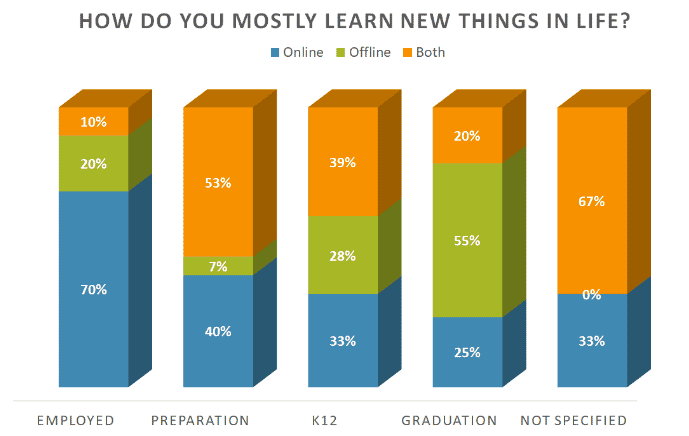However, it also has profoundly affected the world of education, causing an enormous shift from traditional four-walled classrooms to virtual classes.
The uncertainty of the lockdown created confusion and low efficiency for students.
Online classes helped their students greatly due to the continuance of their education and classes that keep student activity and learning. Let's see how online classes will be the future of education!
Virtual Teaching

A lot of professors (especially the faculty with older years) were skeptical of the possibility of using online platforms for teaching. It required some time to adjust to the virtual learning environments.
However, as they learned about the latest technologies in virtual classrooms, particularly video platforms such as Zoom or Google Classrooms, the result was ultimately positive.
Since online learning was the norm for college and school teachers from all over the world were given instructions by their respective educational institutions to complete the remaining syllabus using online teaching.
At the same time, for students, online learning has helped free up travel time for work to pay for college, because in spite of the situation, tuition payments are coming in regularly.
In the frantic pace of life, students can stay on top of their grades with a study crumb service that can help a student with any college assignment.
Even with its limitations, online learning has served as an important indicator of how education can be sustained post-COVID. teachers and professionals can use these tools to extend their capabilities.
online learning vs classroom learning - Opinions

Online vs Offline Learning Survey in Education Sector - Source
Physical and online classrooms each have their own distinct significance and it's not worth it to argue about two different media that interact.
Online classes do not have the personal touch of a classroom and one-to-one interactions between students and teachers. However traditional classrooms aren't flexible and more accessible to many students, particularly those from communities that are less fortunate.
Interaction and attention are a matter of fact to everyone and cannot be traced to any specific platform or method of learning.
Both students and instructors have improved creativity and interaction through the use of chatboxes, whiteboards, screen-shares, and other tools. These are helpful to present pictures or PowerPoints.
Therefore, online classes being the norm offered the world the chance to allow learning to be easier and more accessible on a global scale. It's also affordable as a high-speed internet connection and a working computer is all you require to give your class.
To help bridge the gap in personal interaction students may also utilize individual chats or calls to clear their confusion and grasp the concepts in a way that is effective.
Relying upon the Silver Lining
There are a few issues that have been raised about the constant use of electronics and the negative effects on the eyes.
Since the majority of content and interactions are carried out through the screen, it's lowered the amount of time spent by students. Children lose their focus when they are in long and more classes, and the purpose of teaching ceases to be worthwhile.
Participating in online classes or platforms doesn't provide the same sense of physical interaction. In fact, it can be compared to a robot on a screen.
Therefore, we need to address some of the negatives of online learning before it becomes the norm, however, until the epidemic is eradicated, we must concentrate on the bright side and make learning online as easily accessible as we can.
Online Classes as compared to Offline Classes
The Covid-19 pandemic caused an abrupt change in the global education sector. The introduction of lockdown caused the closure of physical classrooms, and online education was normal.
While it is true that online learning has helped keep education relevant even in difficult times but it is not able to substitute for it.
Both offline and online education each have their own advantages and drawbacks. In this blog, we'll examine one of the hotly debated subjects nowadays, online classes as opposed to offline classes.
Education Online Vs Offline Education
Although online education isn't something new it was brought to light in the aftermath of the outbreak of the pandemic. Below is a table that outlines the key distinctions between online education and offline education.
Specifications | Educational Online | Offline education |
Methodology of Teaching | Digital tools and methods for teaching | Traditional methods and tools for teaching |
Time and Cost | Time-saving and cost-effective | Costs more than online education, and takes more time |
Location | Virtual classrooms | Physical classrooms |
Flexibility | Online classes are flexible in their timetable | Offline classes are based on an exact and rigid schedule |
Communication | Digital collaboration and communication are a reality | Collaboration and communication happen face-to-face. |
The Type of Approach | Facilitation and asynchronous approaches | Asynchronous and instructional method |
Pace of Learning | The pace of learning is largely determined by students of their learning | The rate of learning |
Level of Commitment | They are more likely not to be focused and dedicated to their studies | Students are more focused and dedicated to their studies. |
Educational Online
Since the advent of technology in the last decade, the method of providing education has changed completely. In actuality, online education has developed into an effective method of education where students have access to learning materials from the comfort of their own homes.
Furthermore, online education gives students a great opportunity who aren't able to enroll in traditional classrooms and aiding students to determine their own study pace.
The online education system helps to instill the habit of self-control as well as managing time among students. It also gives students an unlimitable amount of educational resources. Students are able to decide their own pace for learning, as they possess access to a reliable internet connection.
Offline Learning

Education that is offline can be described as the most traditional alternative to online education and is the primary method of learning that permits students to engage in regular face-to-face interaction with their peers and their teachers.
While the internet is believed to become the new way of learning but it is not able to substitute for the holistic aspects of traditional education.
Furthermore, offline education lets teachers monitor the behavior and reactions of their students and respond to them when necessary. So, regardless of how technologically advanced online education has become offline education will always play an important role in the growth of students.
Method of Instruction in Online and Offline Classes
In the case of virtual classes for teachers, they are able to effectively teach their students through virtual classrooms. Students are able to easily access their education materials from any location provided they have the internet.
Online classes give teachers access to numerous online learning tools like animations, videos, audio as well as virtual whiteboards, conference rooms, and live chats with students.
However offline classes offer students an actual learning environment inside the confines of a classroom.
It lets students have a close relationship with their instructors and participate in discussions and debates live. Students also have the opportunity to take part in leisure activities such as physical and art education that helps in the physical and mental development of the pupil.
Accessibility

Global growth in online learning/Source
One of the biggest benefits that online learning classes offer is that they are accessible to anyone around the globe. Students are able to log on from any place and access information from the comfort of home.
Applications like Zoom as well as Microsoft Team have allowed students to attend lectures without leaving the comfort of their homes. Thus, online classes have the advantage of flexibility in location.
However offline classes need pupils to go to the campus of their school. The teaching is conducted in a specific location that usually consists of an auditorium or physical classroom.
Some students might have to travel long distances to reach their educational institutions which can result in an immense amount of hassle.
Time Management
Students who take online classes have to face the huge challenge of managing their time. Students who are online are often overwhelmed by numerous tasks and are not able to keep a clear plan.
Because online classes offer the benefit of self-paced learning and flexibility, students aren't able to have a clear schedule and can fall prey to their habit of procrastination.
Additionally, students are expected to remain logged into the online class for a long period of time, which could result in students browsing the internet for distractions, or checking their social media profiles.
For online classes, the students need to follow the strict timetable which has been established by their teachers. Additionally, due to the possibility of synchronous learning students are expected to complete their assignments and assignments within a timeframe.
Flexibleness of Classification
The flexibility of the classes is the primary benefit of online courses. Students can decide their own pace for learning without any added stress.
As students have access to recorded videos as well as reading materials online They can take classes whenever they are appropriate. This also allows students more time to digest content and complete their assignments or research at their own pace.
It is necessary to adhere to a certain degree of rigidity in regard to online education. Students must take their lessons or classes at the right time, as there aren't any pre-recorded video recordings or notes that are readily accessible to students.
Thus, students are required to adhere to a strict schedule that is determined by their institution of education.
Students-Teachers Interaction

Contrary to popular belief that there is no interaction between teachers and students when it comes to online education there is a huge degree of interaction between teachers and students through the online platform.
Online classes permit students to contact their teachers at any time or place. Classrooms online allow for two-way communication, which can greatly impact learning. Students-teacher interactions in online classes could be both synchronous and non-synchronous.
There is interaction between students and teachers when it comes to offline classes, particularly because the teaching process is synchronous.
Students and teachers are in constant contact. teachers and students, which permits lively debates and discussions between them.
Additionally, it allows students to quickly address their concerns and receive immediate feedback. Instructors are switching to new techniques of teaching to encourage students.
Technical Problems in Online and Offline Classes
Online classes are often hampered by technical problems. Access to the right electronic equipment like microphones, cameras, and computers as well as an internet connection that is reliable is an essential requirement to take online courses.
Furthermore, technical issues like slow internet connections or the absence of an appropriate technological infrastructure could hinder efficient learning. Students might have difficulty watching live lectures or downloading online notes or videos.
Offline classes are not often threatened by technical problems. Teachers and students aren't expected to be extremely tech-savvy. Since the majority of learning takes place in the classroom, technical issues aren't a major issue, except for all lessons that require presentations or computers.
Practical Teaching
Education online is only academic and is conducted completely online. Students are not allowed to participate in the practical aspects of learning that are equally crucial to education.
The subjects of chemistry, physics, biology, art, and sport require that students be present in order to perform live experiments or take part in the activities.
Offline classes are an engaging environment that blends both the practical and theoretical elements of education, as opposed to online classes.
This improves the overall mental and ability development of students. Learning through practical means helps you learn and rapidly adapt to everyday challenges and situations. It also helps you gain more understanding of the lessons.
Online Classes or Offline Classes, which is your preference?
Benefits of Offline Classes at Schools
The process of education is skills that must be interconnected as well as innovative to develop students can develop a variety of abilities are developed, such as writing, reading listening, and speaking skills.
In these times of epidemics, we have also realized the importance of technology and in some way, we've created the mindset of sitting in a room as if in a classroom.
Little kids in elementary and kindergarten weren't accustomed and prepared to sit down and go to online classes for two or three hours.
Small Kids Do Not Understand the Online Education Method
Students from Grade 4 to upwards also required the assistance of their families.
Parents also have to be aware of whether their children are having fun or participating in the lessons. Little children from Nursery or Kindergarten Play Group are not able to stay for long periods of time. or more hours.
Students Learn to Maintain Discipline
School campuses and school schedules are vital to students' lives since schools teach methods of discipline.
Furthermore, when children are at school the child develops a keen curiosity about studies and interpersonal abilities.
Regularly Finalization Of Academic Task
Students is mentally prepared to sit in a proper manner keep their discipline and follow the teacher's directions in an offline classroom. Students are expected to complete their work frequently in the classroom, however, the interaction is lower than interaction in the online classroom.
The Learning Various Skills

A great school campus, such as the one that we are able to find in Sage International School, the most prestigious CBSE institution in Bhopal isn't just a place for students, but it is also an area where they can develop leadership skills through playing with their friends on the team.
They develop sharing skills through sharing their favorite chocolates with their friends and gain confidence when they perform well at physical exercises that they have been taught by the instructor.
There is no more Gadget addiction
In addition, today's online classes have led our students to become obsessed with gadgets They are also prone to forgetting to play outdoors due to the threat of lockdown or pandemics.
The more time students are spending on laptops or mobiles, the more they use thinking creatively and rationally. thinking tends to be diminished.
Improved Student-Teacher Interaction
Offline classes on School Campuses are better for teachers as students are physically interfacing with one another. Additionally, teachers can examine whether pupils are focusing on the subject or not.
Because there is physical eye-to-eye contact, the students aren't distracted by other activities.
At SIS which is a school for public children located in Bhopal, we have bright classrooms with safe facilities for our students. And our students are enthralled by spending their time with teachers and their friends.
Save Resources

Offline classes do not require any additional devices connected to the internet or any electronic gadget such as a tablet, laptop, or mobile students. Parents who work needn't worry about anything when they send their children back to their schools.
At SIS an excellent school located in Bhopal the majority of students choose to take classes offline and are enthused by each and every activity since they're returning to school after one year. Additionally, there is no problem attending classes when you are without Internet or electricity issues at home.
No Disturbance
For online classes, parents face difficulties in preparing their kids for online classes, and often students wake up, begin their online class, and continue with their routine tasks.
In the end, just their attendance is completed and they do not gain any understanding or even interest. When they are in offline classes students have to get dressed in time for school and even TV or guests disturbances won't affect students.
The school year has begun and we are grateful to parents who send their kids to school. Of course, we will keep our school safe also.
Benefits of online learning for your workforce
Who believed that online education could only be used for students? It's actually an excellent instrument that can be used by corporations to benefit employees and the business itself.
With the emphasis shifting towards a better balance between work and life and a more balanced lifestyle, businesses have realized that their employees need to be treated with more respect than ever before.
One thing that businesses have put the most emphasis on lately is training their employees. One way to do this is by focusing on courses and workshops that could be taken at an employee's personal pace and at their own pace.
Employees not only get this benefit, but it's an attractive benefit to have for those who are considering the possibility of a new job.
In addition, the company will have a workforce that is happy. This article will highlight the advantages a business could consider when considering online training for its employees.
1. The ability to be flexible and convenient
Online education is accessible virtually anywhere, anytime, using your smartphone, computer, or tablet. The only requirement is a computer as well as a reliable internet connection.
If you're at home, on a holiday, or working, you'll be in a position to access your classes at any time. Online courses are designed to accommodate employee flexibility, not the reverse.
2. Effective time management
Since you do not have to organize the speakers or workshops beforehand it is possible to schedule online classes if it is a good fit for your team's schedule.
There are times when life happens and we all have to manage time with family, work, and playtime. Due to the reality that there's no specific time for you to attend the classes, you can efficiently manage your timetable to meet your individual needs.
Additionally learning online is easy and affordable (we'll come back to this later, too) as you do not have to devote hours or months to finish a class or module. E-learning or online education is offered in bite-sized bits of information that can be quickly absorbed by students.
3. Self-motivation
Learning online requires an intense focus and determination, as well as determination. Employers and potential employers alike see this as an advantage in the process of deciding whether to promote or recruit employees.
This also indicates that you are able to take your time and make decisions on your own.
4. Learning at your own pace

There are times when you be familiar with the fundamentals of a subject but would prefer to not attend a class or two.
If you are learning traditional methods this would not be feasible. The eLearning platform gives students the ability to skip over or skip specific tasks, lessons, and tasks a lot faster when they believe they are proficient in the topic.
5. Many courses to choose from (improving technical abilities)
If you'd like to know how to make your own candles or are looking for leadership and management classes, the choices of online education are boundless.
You'll find many classes to choose from, but online education also enhances students' technical capabilities.
A listing of the online courses on your resume does not just indicate that you're an independent learner, but also that you possess the technical expertise that is required by the majority of companies today.
6. Cost-effectiveness
Traditional education comes with an expense, and with good reason. When you study online, there aren't the expenses that traditional institutions of learning have.
This gives institutions that offer online education the capacity to provide high-quality education at a fraction of the cost.
7. Retention of employees
Motivation for employees can be boosted by offering an online learning option. It's become the norm for many companies to include learning opportunities in their employee benefits plans.
This not only provides employees to improve their skills but also is a sign that the company takes interest in the individual of the employee by taking care of their personal requirements too.
8. Accommodates different learning styles
With the help of gaming and interactivity, online learning is able to cater to various ways of learning. The self-paced method of learning helps the student retain information much more effectively instead of being confined in a class for lengthy durations of time.
9. Uniform and standard
Because online courses are standard and consistent, your outcomes are going to speak for themselves. Results are typically accessible instantly and also. The same standards and standards will be used for all students taking this same class.
10. Expert support and global collaboration
While eLearning is mostly driven by students' own motivation and enthusiasm, they have the ability to get assistance from experts when they need it. Additionally, you have the chance to meet with students from all over the globe, which can enhance the global experience of collaboration.
Conclusion
In essence, online learning leverages technology for virtual education access, while offline learning fosters in-person interaction between students and instructors. This creates a spectrum of learning experiences, with each approach offering distinct advantages for the right learner and educational goals.
Further Readings:

